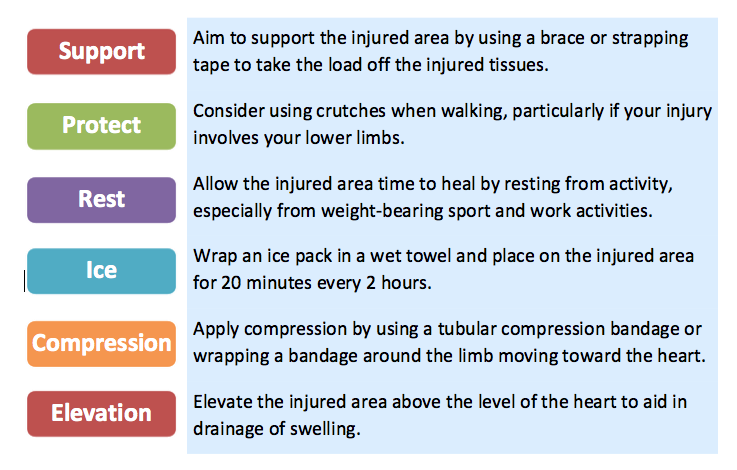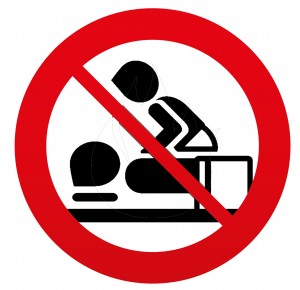Traumatic injuries are a common occurrence in any sport, and unfortunately may lead to pain, reduced strength and a loss of game time. During the first 24-72 hours after an initial injury, the body initiates an automatic inflammatory response which leads to swelling. If not controlled, excessive swelling may cause pain, loss of movement range, destruction of previously uninjured surrounding structures, and eventually excessive scar tissue.
The best way to ensure that your body is given the optimum chance to heal is to take immediate action to control swelling, using the following steps as a guideline:
Avoid HARM
There are a number of factors that may worsen an acute sporting injury (such as knee, ankle or shoulder). The following should be avoided for sporting injuries during the initial 48-72 hours when the body’s inflammatory response is most active.
Heat: Do not use heat on the injured area in this initial stage, as heat increases blood flow and therefore increases the amount and rate of swelling and bleeding.
Alcohol: Avoid drinking alcohol as this increases blood flow and therefore increases swelling.
Running: Exercising too soon after an injury may overload the weakened body part and may lead to further damage.
Massage: It is best to avoid massage in the initial stages of recovery, as the pressure may disrupt healing and increase swelling.
Your Physiotherapist may be able to assist you in developing a rehabilitation program for your injury, to enable you to return to sport safely and effectively.
Preventing Injury: An Effective Warm Up
A graded and gradual warm up targeting the correct muscle groups is essential to optimise performance and prevent injury during sport.
Time: A warm up of about 10-15 minutes is usually adequate.
Intensity: Low to moderate intensity.
Aerobic: Start with gentle cardiovascular exercise such as jogging, sideways galloping, and high knee running to warm up your muscles and increase your energy levels.
Stretching: Remember how you used hold each stretch for 30 seconds before a game? Well recent studies have shown that this ‘static’ stretching actually decreases muscle power immediately afterwards when you need it to be at its best. The consensus is now that dynamic stretching (which involves gently moving a muscle throughout its full range) is best prior to sport. Example include swinging leg stretches, bottom kicks, and lunges.
Recovery: It is just as important to have an effective cool down with an emphasis on active rather than passive recovery. Studies have shown that an active recovery incorporating low intensity aerobic exercise such as jogging speeds up the removal of lactic acid and therefore aids in muscle recovery.
Combat Dehydration
Hydration is essential during sport to allow for the fluid losses from sweating, and the extra metabolic requirements of the body during exertion. It is recommended that at least 100-300mL of fluid be consumed every 15 minutes during moderate intensity exercise. Water alone is effective in replacing fluid after low intensity exercise of a short duration, however with higher intensity exercise, sports drinks are more effective at replacing fluids and keeping electrolyte levels within a normal range. It is best to drink sports drinks quickly and rinse your mouth out with water afterwards to avoid dental decay associated with the high sugar content.
Delayed Onset Muscle Soreness (DOMS)
DOMS is a type of muscle soreness that typically occurs between 12-48 hours following an intense or unaccustomed bout of exercise. Although DOMS may involve significant pain and stiffness it is a temporary condition that eventually leads to muscle adaptation and increased muscle strength. Treatment of DOMS is limited, but gentle stretching, ice and heat may ease symptoms. Occasionally more serious conditions such as muscle strains or tears may masquerade as DOMS, so if your symptoms persist, consult your Physiotherapist.


